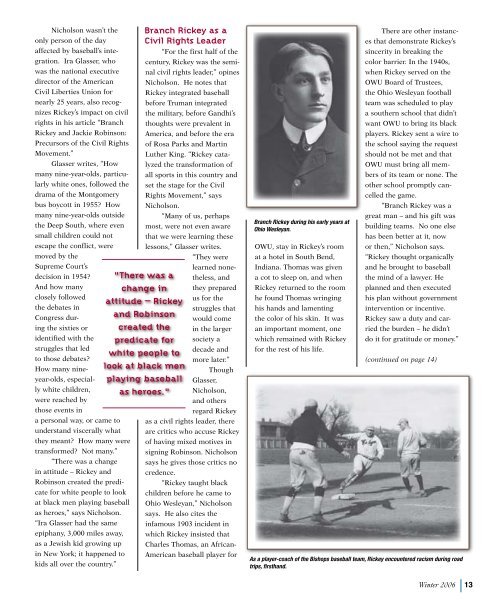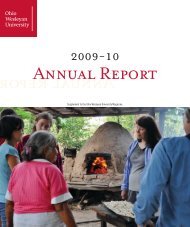Ohio Wesleyan Magazine - Ohio Wesleyan University
Ohio Wesleyan Magazine - Ohio Wesleyan University
Ohio Wesleyan Magazine - Ohio Wesleyan University
You also want an ePaper? Increase the reach of your titles
YUMPU automatically turns print PDFs into web optimized ePapers that Google loves.
Nicholson wasn’t the<br />
only person of the day<br />
affected by baseball’s inte-<br />
gration. Ira Glasser, who<br />
was the national executive<br />
director of the American<br />
Civil Liberties Union for<br />
nearly 25 years, also recog-<br />
nizes Rickey’s impact on civil<br />
rights in his article “Branch<br />
Rickey and Jackie Robinson:<br />
Precursors of the Civil Rights<br />
Movement.”<br />
Glasser writes, “How<br />
many nine-year-olds, particu-<br />
larly white ones, followed the<br />
drama of the Montgomery<br />
bus boycott in 1955? How<br />
many nine-year-olds outside<br />
the Deep South, where even<br />
small children could not<br />
escape the conflict, were<br />
moved by the<br />
Supreme Court’s<br />
decision in 1954?<br />
And how many<br />
closely followed<br />
the debates in<br />
Congress dur-<br />
ing the sixties or<br />
identified with the<br />
struggles that led<br />
to those debates?<br />
How many nine-<br />
year-olds,especial- ly white children,<br />
were reached by<br />
those events in<br />
a personal way, or came to<br />
understand viscerally what<br />
they meant? How many were<br />
transformed? Not many.”<br />
“There was a change<br />
in attitude – Rickey and<br />
Robinson created the predi-<br />
cate for white people to look<br />
at black men playing baseball<br />
as heroes,” says Nicholson.<br />
“Ira Glasser had the same<br />
epiphany, 3,000 miles away,<br />
as a Jewish kid growing up<br />
in New York; it happened to<br />
kids all over the country.”<br />
“For the first half of the<br />
century, Rickey was the semi-<br />
nal civil rights leader,” opines<br />
Nicholson. He notes that<br />
Rickey integrated baseball<br />
before Truman integrated<br />
the military, before Gandhi’s<br />
thoughts were prevalent in<br />
America, and before the era<br />
of Rosa Parks and Martin<br />
Luther King. “Rickey cata-<br />
lyzed the transformation of<br />
all sports in this country and<br />
set the stage for the Civil<br />
Rights Movement,” says<br />
Nicholson.<br />
“Many of us, perhaps<br />
most, were not even aware<br />
that we were learning these<br />
lessons,” Glasser writes.<br />
“They were<br />
learned none-<br />
theless, and<br />
they prepared<br />
us for the<br />
struggles that<br />
would come<br />
in the larger<br />
society a<br />
decade and<br />
more later.”<br />
Glasser,<br />
Though<br />
Nicholson,<br />
and others<br />
regard Rickey<br />
as a civil rights leader, there<br />
are critics who accuse Rickey<br />
of having mixed motives in<br />
signing Robinson. Nicholson<br />
says he gives those critics no<br />
credence.<br />
“Rickey taught black<br />
children before he came to<br />
<strong>Ohio</strong> <strong>Wesleyan</strong>,” Nicholson<br />
says. He also cites the<br />
infamous 1903 incident in<br />
which Rickey insisted that<br />
Charles Thomas, an African-<br />
American baseball player for<br />
Branch Rickey during his early years at<br />
<strong>Ohio</strong> <strong>Wesleyan</strong>.<br />
OWU, stay in Rickey’s room<br />
at a hotel in South Bend,<br />
Indiana. Thomas was given<br />
a cot to sleep on, and when<br />
Rickey returned to the room<br />
he found Thomas wringing<br />
his hands and lamenting<br />
the color of his skin. It was<br />
an important moment, one<br />
which remained with Rickey<br />
for the rest of his life.<br />
There are other instanc-<br />
es that demonstrate Rickey’s<br />
sincerity in breaking the<br />
color barrier. In the 1940s,<br />
when Rickey served on the<br />
OWU Board of Trustees,<br />
the <strong>Ohio</strong> <strong>Wesleyan</strong> football<br />
team was scheduled to play<br />
a southern school that didn’t<br />
want OWU to bring its black<br />
players. Rickey sent a wire to<br />
the school saying the request<br />
should not be met and that<br />
OWU must bring all mem-<br />
bers of its team or none. The<br />
other school promptly can-<br />
celled the game.<br />
“Branch Rickey was a<br />
great man – and his gift was<br />
building teams. No one else<br />
has been better at it, now<br />
or then,” Nicholson says.<br />
“Rickey thought organically<br />
and he brought to baseball<br />
the mind of a lawyer. He<br />
planned and then executed<br />
his plan without government<br />
intervention or incentive.<br />
Rickey saw a duty and car-<br />
ried the burden – he didn’t<br />
do it for gratitude or money.”<br />
(continued on page 14)<br />
As a player-coach of the Bishops baseball team, Rickey encountered racism during road<br />
trips, firsthand.<br />
Winter 2006 13



